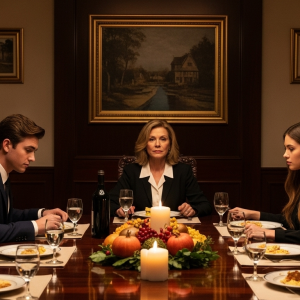The Chicago wind was a merciless predator, howling down the canyons between skyscrapers and clawing at the windows of Maria’s small coffee shop, “The Daily Grind.” The cafe was her sanctuary and her struggle, a warm, fragrant bubble of cinnamon and roasted beans fighting against a tide of debt. Every hiss of the espresso machine was a small victory; every threatening letter from her landlord, a fresh wave of anxiety.
Her landlord was a man named Mr. Peterson, a person who seemed constitutionally incapable of seeing people, only seeing assets and liabilities. To him, Maria was a liability, consistently a few days late on the ever-increasing rent. The historic building she loved, with its charming tin ceiling and original hardwood floors, was just an asset to be squeezed for every last drop of profit.
And then there was John. To Mr. Peterson and most of the world, John was just another piece of the city’s unfortunate scenery. A homeless man, a ghost in a threadbare army jacket who sat on the frigid sidewalk outside her shop, never asking for anything, his gaze fixed on a point somewhere in the distant, haunted past. He was a veteran, she’d gathered from the faded patch on his coat, but he never spoke of it.
Maria saw something else. She saw a quiet dignity in the way he kept his small space on the pavement tidy, a profound sadness in his startlingly blue eyes. She saw the tremor in his hands that had nothing to do with the cold. So, she brought him coffee, hot and sweet, and sometimes a pastry she’d “accidentally” made too many of. He would just nod, a silent acknowledgment passing between two people clinging to different kinds of ledges.
The foreshadowing of disaster came not in a roar, but in a smell. A faint, acrid scent of hot plastic that would briefly appear when the kitchen lights flickered. Maria, worried, had sent a formal, recorded-delivery email to Mr. Peterson a month ago. “The wiring in the kitchen seems old and potentially faulty,” she wrote. “I am concerned it may be a fire hazard.” Peterson’s emailed response was a single, dismissive line: “Unauthorized electrical inspections will be considered a breach of your lease. Focus on paying your rent on time.”
Meanwhile, John’s own past was a constant, smoldering fire. Some nights, as he tried to sleep in a nearby alley, the nightmares would come—roaring flames, the sickening groan of collapsing timber, the screams. He’d wake up gasping, the phantom smell of smoke in his nostrils, his heart hammering against his ribs like a trapped bird. He was a ghost, haunted by a fire he could never extinguish.
One evening, the temperature plunged into the single digits, a brutal, life-threatening cold. Maria was closing up, her heart aching at the thought of John outside. She looked at the worn-out sofa in the corner of the shop. She knew the risks. She knew what Peterson would do if he found out. But then she looked at John, huddled against the brick wall, and the risk no longer seemed to matter. She opened the door. “John,” she said softly. “It’s too cold. Please… come inside. You can have the sofa after I lock up. No one will know.” For the first time, he looked directly at her, and in his eyes, she saw a flicker of disbelief, and then, a wave of profound, unspoken gratitude.
The night deepened, blanketing the city in a deceptive quiet. Inside “The Daily Grind,” John was asleep on the old sofa, a thick wool blanket Maria had left for him pulled up to his chin. For the first time in months, he was warm, a deep and dreamless sleep finally granting him a temporary peace from his demons. The only sounds were the hum of the refrigerators and the groan of the old building settling in the cold.
Above the cafe, life went on in the apartments that Peterson so neglectfully managed. On the second floor, a young couple, the Garcias, slept soundly, their four-year-old daughter breathing softly in the room next door. On the third floor, Mr. Henderson, a retired widower, dreamt of his late wife. None of them knew they were sleeping on the edge of a precipice.
Deep within the walls of Maria’s kitchen, the source of the faint, acrid smell was reaching its breaking point. A frayed wire inside the ancient, overloaded junction box, a relic from the 1950s, finally gave way. It spat a single, brilliant spark. The spark landed on a brittle, century-old wooden lath, insulated with decades of dust and grease. There was no flame at first, just a tiny, orange ember that glowed in the darkness.
Slowly, insidiously, the ember grew. It fed on the dry wood, a silent, hungry thing. It began to climb, a snake of smoke slithering up through the wall cavity. The building’s fire alarm system, which Peterson had “saved” money on by never having it properly inspected or updated, remained completely, criminally, silent. There were no bells, no flashing lights. There was only the quiet, steady progress of the fire.
The scene was one of lethal innocence. The fire, now a small, determined flame, licked up the interior of the wall. It reached the space directly beneath the floorboards of the Garcia family’s apartment. The image was a portrait of impending tragedy: the sleeping child, her favorite teddy bear tucked beside her, while just a few feet below, a fire was gathering its strength, ready to devour them all.
John was not awakened by a sound, but by a smell. It was a scent so deeply seared into his memory that it bypassed thought and went straight to his soul: the unmistakable, sharp odor of burning electrical wiring. It was the prelude to hell, the scent that had haunted his waking moments and fueled his nightmares for years. His eyes snapped open in the darkness.
For a heartbeat, he was paralyzed, the crushing weight of his PTSD threatening to pull him under. The terror was a physical thing, a cold hand gripping his heart. He could hear the phantom screams, feel the phantom heat. But then, something else kicked in. A deeper, older part of him, a part he thought had died in that last, terrible fire. The training. The instinct. The firefighter.
His body moved before his mind could panic. He swung his legs off the sofa, his bare feet hitting the cold floor. The smoke was thin in the main room, but thicker near the kitchen. He moved low to the ground, his motions fluid and automatic. He didn’t run towards the front door. He ran towards the danger.
He burst into the kitchen. A section of the wall near the circuit breaker was glowing a sinister orange, smoke pouring from the cracks in the plaster. He knew, with a fireman’s certainty, that the entire wall cavity was an inferno. He grabbed the small fire extinguisher from its bracket, his hands steady. He pulled the pin, aimed the nozzle at the base of the visible flames, and squeezed the handle.
The chemical spray knocked the flames back with a whoosh, but John knew it was a temporary victory. He wasn’t trying to extinguish the fire; he was trying to buy time. He could hear the fire now, a hungry crackling inside the wall. It was spreading upwards. Fast. The extinguisher sputtered and died. The flames reappeared, angrier this time. He knew he had only seconds.
His mission was clear, his mind a razor blade of focus. Forget the property. Save the people. He ran to the back door of the kitchen, unlocked it, and burst out into the freezing alley. The shock of the cold air hit him, but he barely felt it. He looked up. Three floors of apartments. Three floors of sleeping people, oblivious to the inferno rising beneath them. Instead of running away to save himself, he sprinted towards the building’s rusted, skeletal fire escape.
The iron rungs of the fire escape were slick with ice, biting into John’s bare hands. He didn’t hesitate. He pulled himself up, his movements powered by a desperate, adrenaline-fueled strength. His past trauma was not a weakness anymore; it was his weapon. He knew how fire behaved. He knew how much time they didn’t have.
He reached the second-floor landing and began hammering on the Garcia’s window with the heel of his hand. The glass rattled in its frame. “Fire! Wake up! Get out now! Fire!” he screamed, his voice raw and powerful, a commander’s voice he hadn’t used in years. Lights flickered on inside. A terrified face appeared, then vanished. A moment later, he heard them scrambling, the child crying. He didn’t wait to see them leave. He was already climbing.
Third floor. Mr. Henderson’s apartment. He pounded on the window, his shouts echoing in the narrow alley. “Everybody out! The building’s on fire!” He saw the old man, dazed and confused, stumble into the living room. John pointed emphatically towards the front door of the apartment, then continued his ascent. He cleared every floor, a phantom guardian angel climbing into the smoky sky, his shouts the only alarm bell the tenants would get.
By the time he reached the roof, gasping for air, the first sirens were screaming in the distance. Below, the alley was filling with panicked, half-dressed residents, their faces pale with shock in the flashing red and blue lights. The fire department arrived, a wave of organized, disciplined force. Firefighters swarmed the building.
A grizzled, older Fire Captain was directing the response when he saw a figure emerge from the smoke at the mouth of the alley. It was John, his face smeared with soot, his body wracked with coughing, his hands bleeding from the climb. The Captain’s eyes widened, a flash of stunned recognition on his face. “John?” he breathed, his voice barely a whisper. “John Miller? My God, is that you?”
Just then, a black sedan screeched to a halt, and Mr. Peterson jumped out, his face a mask of fury. He saw the smoke pouring from his building and his eyes immediately landed on John. “You!” Peterson shrieked, pointing a trembling finger. “It was him! The vagrant! I let him hang around, and he sets my building on fire! Arrest him!”
The Fire Captain, his face like granite, stepped directly into Peterson’s path, blocking his way to John. “You need to be quiet, Mr. Peterson,” the Captain said, his voice low and dangerous. “This man didn’t start the fire. He just saved the lives of every single tenant you have. And I have a feeling he can tell us exactly why your state-mandated, hardwired alarm system didn’t make a damn sound.”
The destruction that followed was not of property, but of a man’s greed-fueled empire. While his firefighters battled the blaze, Captain Miller personally escorted a shaking John to an ambulance. “Just tell me what you saw, Johnny,” he said, his voice gentle, using the old nickname from the firehouse. “From the beginning.”
And John, the silent, broken man, began to speak. The words came out clear, precise, and professional. He described the smell of an electrical fire, the location of the origin point near the old junction box, the speed at which it traveled up the uninsulated wall cavity. “There were no internal sprinklers, Cap,” John said, his voice raspy. “And the alarms… they never went off. Not a single one. It’s a Class B violation. Should have been a full building alert system, hardwired with battery backup.” It was a firefighter’s expert testimony, delivered from the mouth of a man the world had dismissed.
At that moment, Maria arrived, having been called by one of the tenants. She rushed past the barricades, her eyes wild with panic, searching for one person. She saw John, wrapped in a paramedic’s blanket, and sagged with relief. The Captain approached her. “Ma’am, I understand you run the coffee shop here?”
“Yes, The Daily Grind,” she said, her voice trembling. “Is he… is he okay?”
“He’s a hero,” the Captain stated simply. “He saved them all. We’re being told the fire may have been electrical. Did you ever have any problems?” Maria’s eyes flashed with a sudden, steely resolve. “Problems? I have emails. I sent a formal complaint to Mr. Peterson a month ago warning him that the wiring was a fire hazard.” She pulled out her phone. “I have his reply right here, where he threatened me for even mentioning it.”
That was the final nail in Peterson’s coffin. The Captain took the phone, read the email, and walked over to where Peterson was still arguing with a police officer. Armed with John’s expert account, Maria’s documented proof of negligence, and the grim, silent confirmation from the building’s non-functional alarms, the authorities had everything they needed.
The scene played out with a swift and satisfying justice. While the tenants he had so callously endangered were being checked over by paramedics, wrapped in blankets and comforted by neighbors, Mr. Peterson felt the cold, hard click of handcuffs around his wrists. The charge was reckless endangerment, with more to follow. The man who had tried to blame a homeless man for his own criminal negligence was led away in disgrace, his downfall witnessed by the very people he had almost killed.
In the aftermath, the story spread like wildfire. The tale of the homeless hero and the kind shop owner who gave him shelter became a beacon of hope in the city’s often-cynical news cycle. Maria had lost her cafe; the water and smoke damage was too extensive. But she had gained something far more valuable: a community.
The Garcias, Mr. Henderson, and the other tenants, eternally grateful to the man who had saved them, started a GoFundMe campaign for Maria. They told the story of her quiet kindness, of how sheltering John had inadvertently saved all their lives. The fund exploded, with donations pouring in from all over the city and beyond. It was more than enough to rebuild.
John was no longer John the homeless man. He was John Miller, a citizen hero. Captain Miller took him under his wing, treating him like the brother firefighter he had always been. He didn’t just give him a meal; he connected him to the VA programs he had been too lost to find on his own. John finally began the long, arduous process of confronting his PTSD, surrounded by a support system that refused to let him fall through the cracks again. He was awarded the city’s Medal for Civilian Valor, accepting it with a quiet humility that spoke volumes.
Six months later, on a bright, sunny afternoon, “The New Daily Grind” held its grand opening. It was in a better location, with brand new equipment and a plaque by the door that read: “This place was built by a community, in honor of the heroes among us.” The cafe was packed with smiling, familiar faces—the Garcias with their little girl, Mr. Henderson, firefighters from John’s old station.
And sitting at a small table by the window, sipping a cappuccino Maria had made for him herself, was John. He was clean-shaven, his blue eyes clear and calm. He was no longer a ghost haunted by the past, but a man rebuilding his future. He wasn’t a guest sleeping on her sofa; he was her friend, her partner in a story of survival and rebirth. He looked at Maria behind the counter, laughing with a customer, and he smiled. The fire was finally out.




